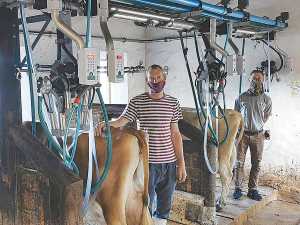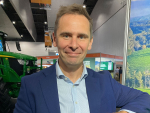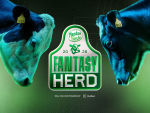Updating to a smart GEA in-line milking parlour was the best solution for improving efficiency without losing the hands-on approach the unique farmers require in their daily work.
Camphill Village was established in 1964 as a residential facility, where today, nearly 100 adults with diverse disabilities and special needs are given an opportunity to lead a healthy and productive life. With challenges ranging from brain injuries, intellectual disabilities and down syndrome, Camphill provides its residents a safe haven where the focus is on getting "stuck in" by creating useful, value-added products.
Set on a 220ha farm near Philadelphia just north of Cape Town, the organisation added a jersey dairy herd and milk processing facility to its operations in the late 1980s.
Alongside its flourishing produce, herb and bakery activities, the Camphill Village dairy has continue to thrive over the years, providing organic dairy products for the residents and surrounding communities. The income from the dairy provides critical funds for the residents who live onsite full time and for paying the support staff. But increasing raw material handling and dairy production had remained a long-standing challenge for Camphill.
The original milk equipment, purchased in the 1980s, was lobg overdue for an upgrade, along with the dairy processing facility which suffered from an outdated design hindering flow and processing efficiency.
The relationship between Camphill and GEA kicked off in 2018 when Camphill farm manager, Antonius Vehoven, got a glimpse of GEA milking equipment in action at a trade fair. Soon after, a GEA Farm Technologies team began working closely with Camphill's management team to find the right milking solution for their needs. The equipment and installation would need to deliver on: process optimisation, ease of maintenance and repairs, improved hygiene and safety.
Two years later, with financial support from German NGO Rays of Hope and some goodwill investment from GEA, Camphill was able to replace its bucket milking system with an in-line "flat" milking system featuring a 1x8 point high line layout.
This meant the new parlour could be installed without altering the existing building or major construction work. In this case, it was necessary that the milking equipment meet modern standards but without a high degree of automation since residents benefit from maintaining close contact with the cows during milking. In fact, this physical interaction is considered to have therapeutic benefits. The integration of a system for recording milk enables the farm to automatically collect and store data about individual animals.
This tool, coupled with the integration of Dairy Plan Herd Management Software, allows the team to take informed decisions related to production, health and fertility and means they can effectively grow the milking herd over time.
"We chose GEA because their team patiently listened to and responded to our myriad of questions - kindly assisting us even before we had committed to purchasing anything," says Verhoven. "The installation was accompanied by friendly, easy to understand explanations of all the equipment as well as hands-on training for our people."
Thanks to these important upgrades, which have improved availability and reliability parameters, the dairy operation at Camphill Village has a much higher throughput of milk products and provides a more stable income stream. Today, with just under 30 cows currently being milked out of a herd of 50, Camphill will finally be able to increase its milk production and dairy processing output.
















